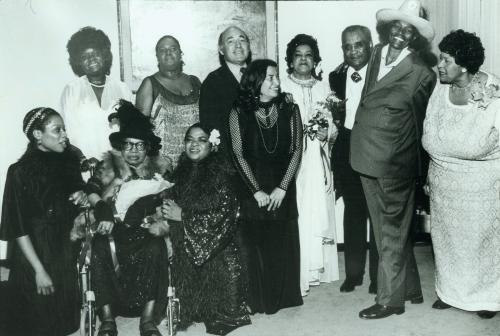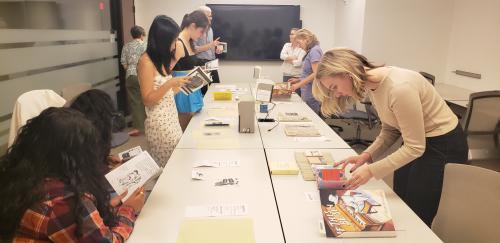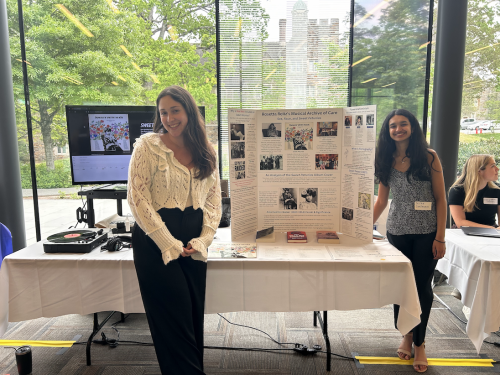
The Archive is an Invitation
Bass Connections Team Reframes Research on 20th Century Blues Artists and Rosetta Records
Like many Duke students, rising junior Lindsay Frankfort is interested in a lot of things. “I like music. I like performing. I’m really into women’s rights, and I want to be a public interest lawyer,” she explained. “And I’m very into activism and making a noticeable change.”

Though describing her own multidisciplinary inclinations, Frankfort could also be talking about those of Rosetta Reitz (1924-2008), the feminist music historian, record producer and label proprietor of Rosetta Records, activist, bookstore owner, concert producer, author (of cookbooks and reflections on menopause) — among other vocations. Housed in Duke’s Sallie Bingham Center for Women’s History and Culture, Reitz’s papers serve as the basis for a multilayered, multiyear Bass Connections investigation into 20th century feminism, race and representation, and the economics of the music industry.

There are two stories that Reitz’s papers bring forth and that the team set out to understand. One story is Rosetta Reitz herself. The other is the purpose and impact of the Rosetta Records label. Reitz founded the label in 1980 to platform the music of Black women blues and jazz artists from the 1920s-1950s whose work had since been both materially lost and minimized by the mainstream music industry. The musicians — around 95 — whose artistic labor grounds the Rosetta Records repertoire raise key issues of archival presence and absence that animate the Bass Connections project.
“One challenge for us is how to honor [Reitz’s interventionist feminist intent] while also figuring out how to find and honor these women’s perspectives on their songs that are not filtered through the lens of Rosetta,” said Lou Brown, Team Co-Leader and Director of Programs at the Forum for Scholars and Publics at the Franklin Humanities Institute. The work of literary scholar and cultural historian Saidiya Hartman — who has written about the archival traces of “unknown persons, nameless figures, ensembles, collectives, multitudes, the chorus” — proved especially helpful in guiding the team’s research questions and engagement with Reitz’s complex archive. “[Hartman’s] work acknowledges the silences of the archives,” Brown said. It also draws attention to the structuring inequities of historical memory and archival preservation. Often, Brown said, “what we hear of the people who didn’t have power [during a particular historical moment] is through the lens of the people who had more power.” In the Bass team’s case, this dynamic shows up in multiple ways: within the racialized power discrepancies between the predominantly Black Rosetta Records artists and their white producer-curator, but also within Reitz’s documentary and interventionist aims in the male-dominated arenas of record production, promotion, and criticism.
Over the course of fall 2023, the team studied critical archival approaches like Hartman’s, Black feminist citational practices, and care ethics alongside the history of the blues, race, and Jim Crow. A typical team meeting would begin with discussion of the reading, and then move toward more active research. This might include a listening session — to, say, excerpts from the album “Sweet Petunias,” the fourth volume released in Rosetta Records’ Independent Women’s Blues collection — guided by one of the students tasked with transcribing the lyrics. The sessions would then evolve into collective sharing and troubleshooting: an open space for team members to present on findings from their archival research focusing on a single artist or album from the Rosetta Records set.

Frankfort’s project focused on the curious presence of Mae West on one of the records. West, the white American actress, certainly didn’t fit Reitz’s model of, as Brown characterized it, “‘bringing people out of obscurity’ into a wider audience.” Facing the need to sell records, Reitz may have included West largely as a business booster — a familiar name, especially for white listeners. Frankfort said she had her own multilayered answer from her archival research reading West’s presence alongside and against that of the Black artists on the record. “But I’m sure [my answer] is more complex, and I could spend forever researching it,” Frankfort said. “Through this project, we’re giving these artists the time that they deserve: researching their lives slowly and thoroughly and trying to understand their full picture. I’ve become a more diligent and thoughtful researcher as a result.”

Rising junior Trisha Santanam researched the Rosetta Records involvement of Victoria Spivey, or “Queen Victoria,” the Black blues singer and vaudeville performer. To piece together more information about Spivey than what Duke’s finding aids afforded, Santanam contacted several other university and institutional archives, learning their idiosyncrasies in the process.
“Doing this project has really helped to humanize the archive,” Santanam said. “It made me think about how we form an archive: the implications of putting an archive together based on our biases and our perspectives. I'm interested in [how archives can be] more accessible to the public. That's what our project really aims to do: is to take archival material and disseminate it in a way that the public can really understand and engage with.”
Public engagements with the team’s work are an important component of the Bass Connections team’s work. This spring, the team hosted a public conversation with Durham musician Rissi Palmer that situated the team’s research questions within present-day concerns about Black women’s labor, intellectual property, and inequitable compensation in the music industry. As the “Archives and Creative Process” Bass project moves into its second year, the team will continue to explore these issues around policy and technology in music as well as present more public events, such as listening sessions, that extend the team’s research.
“I see this project as an invitation,” Brown said. “We’re saying to the world: this archive is here [at Duke], and here are some of the questions it raised for us. If we can inspire one more person to go into the archive, or get them curious about it, [that’s a success].”
Follow the Bass Connections team’s work through their website and the Bass Connections site.
Main image: album cover for "Sweet Petunias."


